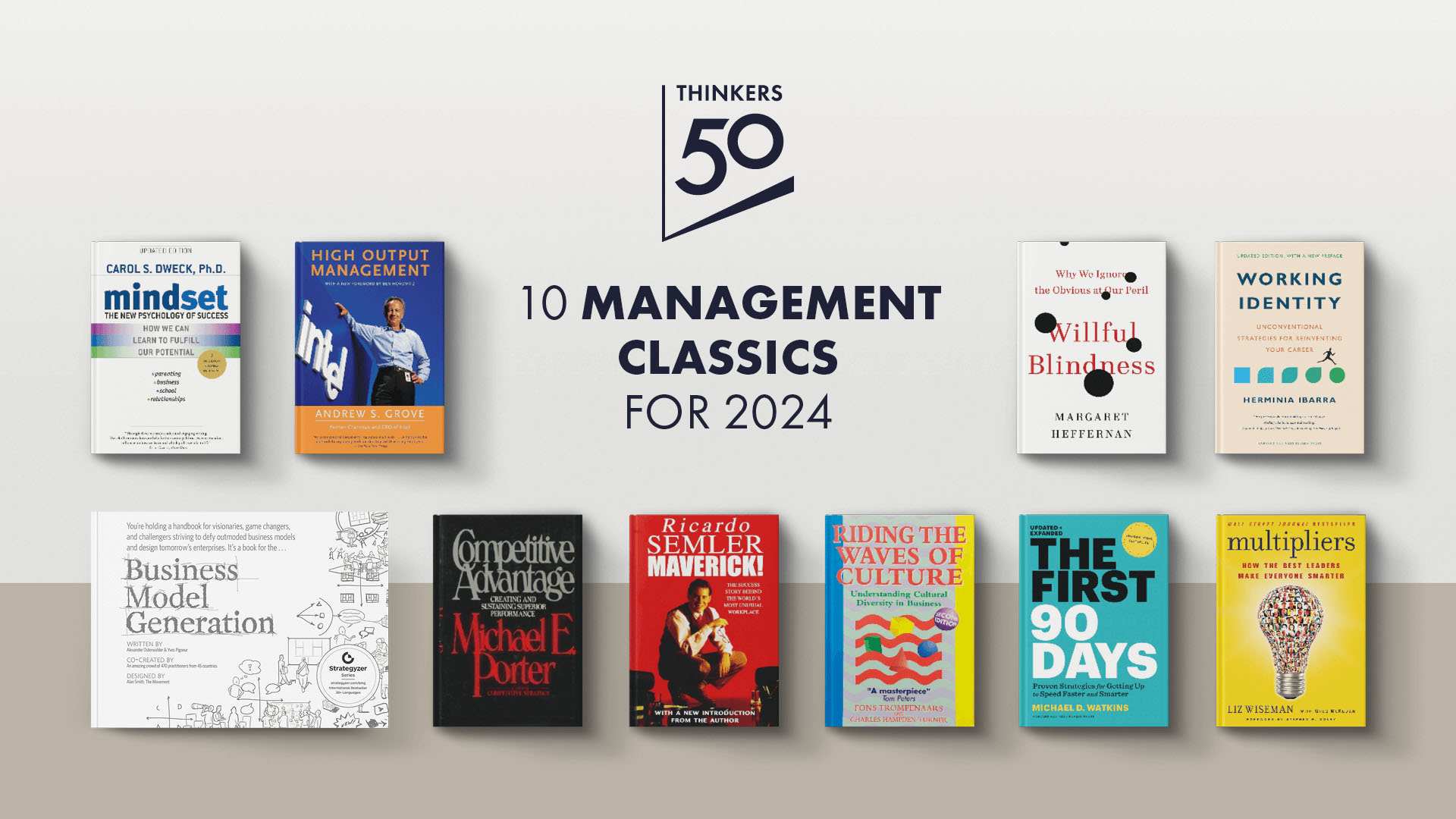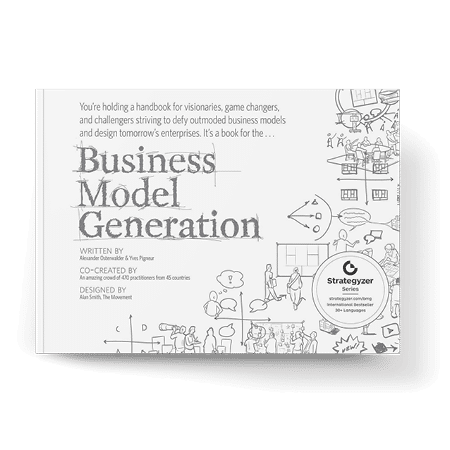
PRESS RELEASE
13 May 2024
LONDON – Thinkers50, the global authority on management thinking, has unveiled its 2024 Management Classics Booklist. This annual curation honours management and business books that have withstood the test of time and remain powerfully relevant today.
Among the exemplary works to be showcased this year are Multipliers (2010) by Liz Wiseman, Business Model Generation (2010) by Alex Osterwalder and Yves Pigneur, and Mindset: The New Psychology of Success (2006) by Carol Dweck. The Booklist also pays tribute to classic titles from the last century, including Michael Porter’s Competitive Advantage (1985), Ricardo Semler’s Maverick (1993), and Riding the Waves of Culture (1994) by Fons Trompenaars and Charles Hampden-Turner.
‘A lot of today’s ideas go back further than you think,’ explains Thinkers50 co-founder, Des Dearlove. ‘Thinkers50 tries to show respect for the originators of management theory and practice.’
‘The Classic Management books are the ones that have had and continue to have a long-term impact on the way people think about and practice management,’ adds Thinkers50 co-founder, Stuart Crainer. ‘They are the coping stones for modern management and remain essential reading for managers everywhere.’
Every year Thinkers50 announces two booklists, one for the Classics and one that features the best of the current crop – the Best New Management Books – which is to be released on 10 June.
Says Des Dearlove, ‘With these two annual lists we are building an indispensable guide for those who want to understand the past, present, and future of management and business.’
Rounding out the 2024 Classics Booklist are High Output Management (1983) by Andy Grove, Working Identity (2002) by Herminia Ibarra, The First 90 Days (2003) by Michael Watkins, and Wilful Blindness (2011) by Margaret Heffernan.
These new additions join the hallowed ranks of Classics from previous years, which include seminal works from each decade since the 1950s, such as In Search of Excellence (1982) by Tom Peters and Robert Waterman, The Innovator’s Dilemma (1997) by Clay Christensen, The Fortune at the Bottom of the Pyramid (2004) by CK Prahalad and The Fearless Organization (2018) by Amy Edmondson.
Books were selected from nominations and canvassed opinions from within the Thinkers50 Community, which comprises many of today’s most eminent business thinkers.
Explains Des Dearlove, ‘To help us compile this year’s Classics List, we reached out to managers and management thinkers to ask which books they would include in their all-time greats – which books do they consider the most relevant today, with the only rule being that participants could not nominate their own book.’
Listed in alphabetical order:

by Alex Osterwalder and Yves Pigneur
‘This book has literally changed the way we think about business models, and innovation. It is now 14 years old, and has such wide influence that it deserves the appellation “classic”.’ – Bill Fischer, Thinkers50 Hall of Fame, IMD
‘Michael Porter’s Five Forces model is still being used throughout the world. That is all you need to know!’ – Shane Cragun, author of The Employee Engagement Mindset
by Andy Grove
‘High Output Management is a bible that every entrepreneur and every manager in the country should look at, read and understand.’ – Bill Campbell, former Apple board member
‘It transformed Happy from micromanaging to a company based on trust and freedom where everybody can make their own decisions.’ – Henry Stewart, CEO, Happy.
by Carol Dweck
‘The psychologist Carol Dweck has had a profound influence on our understanding of motivation, learning, intelligence, and self-belief. She can be largely credited with introducing the word mindset into the management lexicon. Our understanding of the power of mindsets is largely down to her work.’ – Stuart Crainer & Des Dearlove, co-founders, Thinkers50
by Liz Wiseman
‘It’s a fantastic concept, and it really seems like the sort of book that, when it comes up in conversation, everyone agrees that it’s a must-read.’ – Kate O’Neill, Thinkers50 Radar, author of Tech Humanist
by Fons Trompenaars and Charles Hampden-Turner
‘Managing across different cultures was a new thing for many people when this book first appeared. Now it is reality for hundreds of millions of people working in global organisations. Trompenaars and Hampden-Turner laid out the practical issues faced in managing globally with humanity and insight.’ – Stuart Crainer & Des Dearlove, co-founders, Thinkers50
‘The First 90 Days has become the classic reference for leaders in transition. First published in 2003, it outlines basic principles to help leaders transition quickly and efficiently to new professional roles and identifies the most common traps and provides the tools and strategies to avoid them. Practical and inspiring.’ – Stuart Crainer & Des Dearlove, co-founders, Thinkers50
by Margaret Heffernan
‘Wilful Blindness is an engaging read, packed with cautionary tales ripped from today’s headlines as well as a trove of research on why we often stick our head in the sand. With deft prose and page after page of keen insights, Heffernan shows why we close our eyes to facts that threaten our families, our livelihood, and our self-image – and, even better, she points the way out of the darkness.’ – Dan Pink, Thinkers50 Ranking, author of Drive
‘Whether you’re mid-career or just starting out, Herminia Ibarra’s masterpiece provides wise advice and compelling stories to help you find and change your path for greater fulfilment in work and in life. Well ahead of its time when first published, Working Identity now finds its sweet spot of ultra-relevance in our tumultuous era of career searching and pivoting.’ – Amy C. Edmondson, Thinkers50 #1 Ranking, Harvard Business School

Thinkers50 Limited
The Studio
Highfield Lane
Wargrave RG10 8PZ
United Kingdom

Thinkers50 Limited
The Studio
Highfield Lane
Wargrave RG10 8PZ
United Kingdom

Thinkers50 Limited
The Studio
Highfield Lane
Wargrave RG10 8PZ
United Kingdom
| Cookie | Duration | Description |
|---|---|---|
| LANG | 9 hours | Linkedin set this cookie to set user's preferred language. |
| nsid | session | This cookie is set by the provider PayPal to enable the PayPal payment service in the website. |
| sp_landing | 1 day | The sp_landing is set by Spotify to implement audio content from Spotify on the website and also registers information on user interaction related to the audio content. |
| sp_t | 1 year | The sp_t cookie is set by Spotify to implement audio content from Spotify on the website and also registers information on user interaction related to the audio content. |
| tsrce | 3 days | PayPal sets this cookie to enable the PayPal payment service in the website. |
| x-pp-s | session | PayPal sets this cookie to process payments on the site. |
| __cf_bm | 30 minutes | This cookie, set by Cloudflare, is used to support Cloudflare Bot Management. |
| Cookie | Duration | Description |
|---|---|---|
| l7_az | 30 minutes | This cookie is necessary for the PayPal login-function on the website. |
| Cookie | Duration | Description |
|---|---|---|
| CONSENT | 2 years | YouTube sets this cookie via embedded youtube-videos and registers anonymous statistical data. |
| _ga | 2 years | The _ga cookie, installed by Google Analytics, calculates visitor, session and campaign data and also keeps track of site usage for the site's analytics report. The cookie stores information anonymously and assigns a randomly generated number to recognize unique visitors. |
| _gat_gtag_UA_10408481_1 | 1 minute | Set by Google to distinguish users. |
| _ga_ZP8HQ8RZXS | 2 years | This cookie is installed by Google Analytics. |
| _gid | 1 day | Installed by Google Analytics, _gid cookie stores information on how visitors use a website, while also creating an analytics report of the website's performance. Some of the data that are collected include the number of visitors, their source, and the pages they visit anonymously. |
| Cookie | Duration | Description |
|---|---|---|
| NID | 6 months | NID cookie, set by Google, is used for advertising purposes; to limit the number of times the user sees an ad, to mute unwanted ads, and to measure the effectiveness of ads. |
| test_cookie | 15 minutes | The test_cookie is set by doubleclick.net and is used to determine if the user's browser supports cookies. |
| VISITOR_INFO1_LIVE | 5 months 27 days | A cookie set by YouTube to measure bandwidth that determines whether the user gets the new or old player interface. |
| YSC | session | YSC cookie is set by Youtube and is used to track the views of embedded videos on Youtube pages. |
| yt-remote-connected-devices | never | YouTube sets this cookie to store the video preferences of the user using embedded YouTube video. |
| yt-remote-device-id | never | YouTube sets this cookie to store the video preferences of the user using embedded YouTube video. |
| yt.innertube::nextId | never | This cookie, set by YouTube, registers a unique ID to store data on what videos from YouTube the user has seen. |
| yt.innertube::requests | never | This cookie, set by YouTube, registers a unique ID to store data on what videos from YouTube the user has seen. |
| Cookie | Duration | Description |
|---|---|---|
| DEVICE_INFO | 5 months 27 days | No description |
| loglevel | never | No description available. |
| m | 2 years | No description available. |
Thinkers50 Limited has updated its Privacy Policy on 28 March 2024 with several amendments and additions to the previous version, to fully incorporate to the text information required by current applicable date protection regulation. Processing of the personal data of Thinkers50’s customers, potential customers and other stakeholders has not been changed essentially, but the texts have been clarified and amended to give more detailed information of the processing activities.